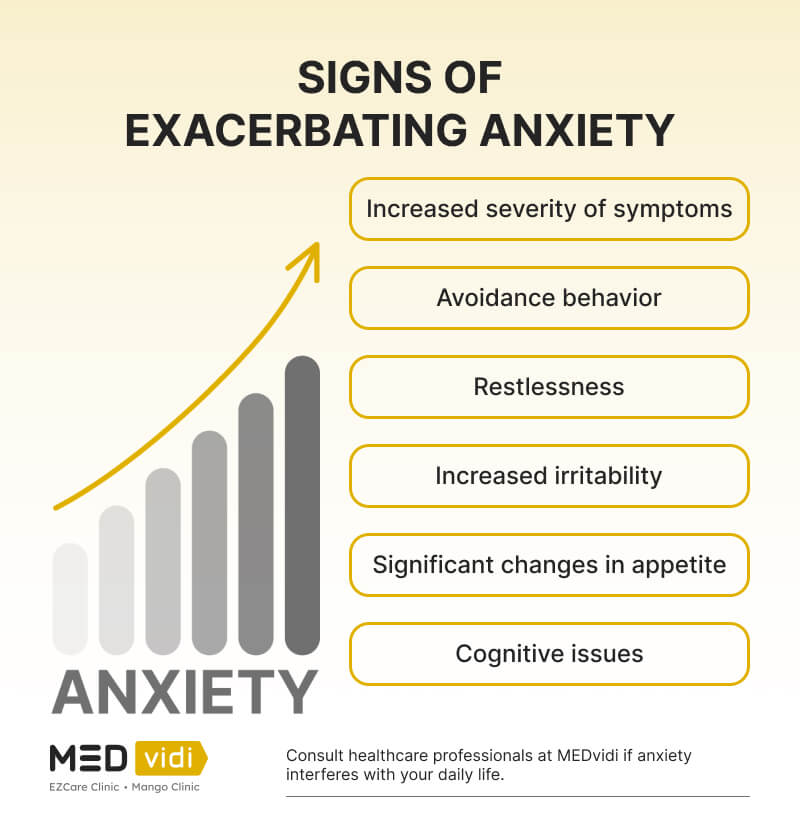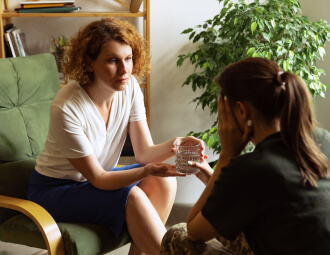It’s normal to occasionally experience anxiety or feel uneasy because of challenges in different areas of life. This emotion may motivate you to take action, better recognize dangers, and respond to them properly. However, when it starts getting worse and impacts your everyday activities and general well-being, it potentially indicates an anxiety disorder.
If you know the risk factors and the warning signs of exacerbating anxiety, you can manage it better and understand when it’s time to seek professional help. Continue reading to learn more about the factors that worsen the symptoms of anxiety disorders and how you can cope with them.
Take the first step towards managing anxiety and achieving peace of mind. Reach out for support today.
What Can Make Anxiety Worse?
Different things may affect the level of anxiety, depending on the initial triggers and individual circumstances. The most common categories are the following:
- Stressful situations:
High-stress[1] situations, demanding duties, or significant life transitions can increase anxiety symptoms. - Isolation: Feelings of loneliness and anxiety can be worsened for some by social isolation or limited interaction with friends and family.
- Negative thought patterns: Continuously thinking negatively and overanalyzing circumstances can worsen anxiety.
- Substance abuse: Alcohol, narcotics, and too much
caffeine intake[2] can worsen the symptoms of anxiety. - Lack of sleep:
Sleep deprivation[3] might increase your vulnerability to worry and impair your capacity to manage it. - Poor diet: An unhealthy diet can affect both physical and mental health.
- Lack of exercise: Being physically inactive can cause tension and restlessness, thereby intensifying anxiety.
- Avoidance: Ignoring circumstances that make you anxious may make you feel better for a while, but it only strengthens your anxiety in the long run.
- Unmanaged medical conditions: Managing your general health is critical because some underlying medical conditions can worsen anxiety. These may include
thyroid problems[4] ,chronic pain[5] , andB12 deficiency[6] . Remember to tell your healthcare provider about any co-occurring symptoms so that they can make a correct diagnosis or refer you to a medical provider for physical assessment and tests. - Negative influences: Being around pessimistic people or watching too much pessimistic material might raise anxiety levels.
Signs Your Anxiety Is Getting Worse
The signs of anxiety disorders may manifest differently from person to person depending on the condition and individual experiences. However, the following signs commonly indicate that anxiety is getting bad:
- Increased intensity of symptoms: Increased frequency or severity of panic attacks and other signs of anxiety.
- Interference with daily life: Anxiety makes it challenging to manage your daily duties, work, school, or relationships.
- Avoidance behavior and social isolation: You tend to avoid events, places, or people that make you anxious more often.
- Constant worry: You worry excessively about an increased number of things, even those that wouldn’t normally cause substantial distress.
- Restlessness and increased irritability: Feeling restless, jittery, agitated or unable to relax.
- Significant changes in appetite or eating patterns:
Overeating [7] or appetite reduction, have occasionally been associated with deteriorating anxiety. - Cognitive impairment: Difficulty concentrating, paying attention, or making decisions.
- Depression symptoms: Your anxiety may be worsening and
co-occurring[8] with depression. Be attentive to the symptoms like persistently poor mood, losing interest in activities, or changes in sleep habits. - Physical symptoms and increased sensitivity: Headaches, muscle tension, exhaustion, upset stomach, and difficulty sleeping. Increased sensitivity to bodily symptoms like heart palpitations, breathlessness, or lightheadedness may show worsened anxiety too.
Contact MEDvidi today to receive professional help.

Treatment Options for Worsened Anxiety
All the common methods for dealing with and controlling anxiety can be broadly divided into psychotherapy, medications, and lifestyle modifications. The best strategy to reduce anxiety is following a holistic approach and discussing several options with a healthcare provider. A mental health professional can develop a treatment plan that would fit your needs and circumstances.
Psychotherapy
Psychotherapy, also called talk therapy or counseling, entails locating and addressing the root causes of anxiety. For example, cognitive behavioral therapy (CBT) can help you recognize and change negative thought patterns and behaviors contributing to anxiety. Moreover, exposure and mindfulness-based therapies can also be beneficial in controlling anxiety symptoms.
Medications
Administering anti anxiety medications for treating anxiety disorders is a common practice. Selective serotonin reuptake inhibitors (SSRIs) and serotonin-norepinephrine reuptake inhibitors (SNRIs) are often prescribed for generalized anxiety disorder or other anxiety disorders such as panic disorder. These medicines assist in controlling neurotransmitter levels in the brain.
Another group of medications, benzodiazepines, provide temporary relief but are only recommended for short-term use due to their high risk of causing dependence. Before beginning any kind of pharmacological treatment, it’s crucial to speak with a healthcare provider, so they can choose the best solution based on your unique needs.
Lifestyle Modifications
Combining psychotherapy, medications if necessary, and healthy lifestyle changes can provide a comprehensive approach to managing anxiety and improving overall well-being. For example,
In Conclusion
Recognizing the signs that your anxiety keeps getting worse is essential to maintaining your mental well-being. Being aware of alterations in your thoughts, feelings, and actions gives you the power to seek help and put good coping mechanisms into action proactively. If you notice bothersome symptoms and believe you might have an anxiety disorder, contact MEDvidi today to see a healthcare provider and receive personalized support and recommendations.
Frequently Asked Questions
Why has my anxiety increased so much?
Societal changes, increasing exposure to stress through technology and social media, impending financial instability, and the fast-paced aspect of modern life may increase anxiety. If you have a persistent feeling of pressure and worry, it’s essential to reach out to a mental health specialist who can assess your situation and diagnose any underlying mental health conditions.
What skills reduce anxiety?
- Mindfulness: Mindfulness practices can assist you in managing your anxious thoughts and helping you stay present.
- Deep breathing: Slow, deep breathing helps induce calmness and reduce anxiety.
- Cognitive reframing: Changing your perspective as well as recognizing and confronting unfavorable thought patterns may help lower anxiety.
- Progressive muscle relaxation: This method of releasing physical tension involves tensing and relaxing muscle groups.
- Time management: Prioritizing tasks and organizing work will help you feel less overwhelmed.
How do you calm severe anxiety?
If you have acute symptoms of anxiety, consider trying one or several of the following techniques:
- Grounding techniques and mindfulness: Focus on what you can see, touch, hear, smell, and taste to get back to the present moment. Put your hands in water, wash your face with cold water, savor a warm beverage, or do a simple workout.
- Deep breathing exercises: Take a few deep inhales and make your exhales slow to calm down your nervous system.
- Progressive muscle relaxation: Contract and relax different muscle groups.
In the case the periods of anxiety appear frequently, consult a healthcare provider who will assess your symptoms and offer treatment.
When is anxiety usually the worst?
Anxiety can be at its worst during significant life changes, stressful circumstances, or unforeseen events. Anxiety levels can rise when moving, beginning a new career, or ending a relationship. Additionally, anxiety might become more intense when you feel out of control or are confronted with major obstacles.
Why does my anxiety keep getting worse?
Anxiety may keep getting worse if you don’t have the necessary skills to deal with the stressors causing it, if the traumatic experience is prolonged, or if you have a comorbid condition, among other reasons. Remember to consult a healthcare provider if anxious feelings interfere with your daily life.
What is the worst level of anxiety?
The severity of anxiety can vary among individuals. Severe anxiety and panic-level anxiety include repetitive and severe periods of panic, accompanied by emotional and physical symptoms, such as fear, a feeling of impending doom, chest pain, dizziness, and difficulty breathing.













